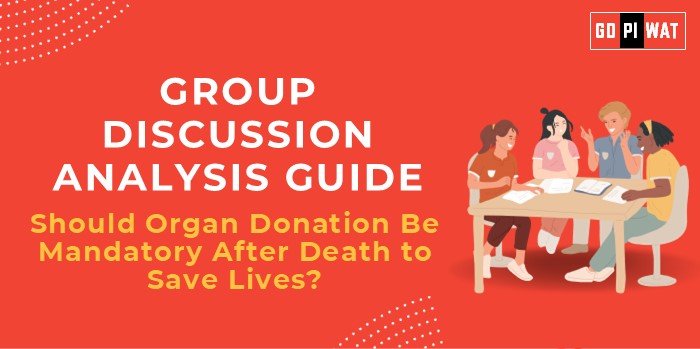📋 Group Discussion (GD) Analysis Guide: Should Organ Donation Be Mandatory After Death to Save Lives?
🌐 Introduction to the Topic
Context Setting: “Every year, thousands of lives are lost due to the unavailability of organs for transplantation, despite medical advancements. Could mandatory organ donation after death bridge this gap?”
Background: Organ donation has evolved over decades, saving lives through kidney, liver, heart, and corneal transplants. Yet, many countries face critical shortages due to low donation rates and cultural taboos.
📊 Quick Facts and Key Statistics
- 🌍 Global Organ Shortage: Over 1 million people worldwide require organ transplants annually, with only 10% receiving them.
- 🇮🇳 India’s Reality: In 2023, India had a donation rate of 0.86 per million, far below the global average.
- 🧠 Brain Death Cases: Up to 70% of brain-dead patients could be potential donors but remain untapped.
- 💓 Impact: One donor can save up to eight lives through organ transplants.
🤝 Stakeholders and Their Roles
- 🏛️ Government Agencies: Develop policies, awareness programs, and frameworks for mandatory organ donation.
- 🏥 Healthcare Providers: Facilitate ethical organ recovery and transplantation procedures.
- 👥 Citizens: Address personal, cultural, or religious concerns regarding organ donation.
- 🌟 NGOs & Advocacy Groups: Drive public awareness campaigns and support donor families.
🏆 Achievements and Challenges
✨ Achievements
- 🔬 Technological Advancements: Improved transplant success rates.
- 📜 Policy Success: Spain’s opt-out system boasts the highest global donation rate (49 donors per million in 2023).
- 📣 Awareness Campaigns: “National Organ Donation Day” campaigns increasing pledges.
⚠️ Challenges
- 🌏 Cultural Barriers: Religious beliefs and misinformation hinder participation.
- ⚖️ Ethical Concerns: Fear of misuse in medical emergencies.
- 🏗️ Infrastructure Gaps: Uneven access to transplant facilities across regions.
🌍 Global Comparisons
Spain: An opt-out system demonstrates the success of presumed consent policies.
The US: With an opt-in system, faces donor shortages despite extensive campaigns.
📚 Case Study
Tamil Nadu (India): A leading state in organ donation, contributing 60% of national transplants in 2023 due to robust policies and awareness programs.
📄 Structured Arguments for Discussion
- ✅ Supporting Stance: “Mandatory organ donation can save millions of lives annually by addressing acute shortages.”
- ❌ Opposing Stance: “Forcing donation violates individual rights and may lead to ethical dilemmas.”
- ⚖️ Balanced Perspective: “While organ donation saves lives, policies should ensure ethical practices and public consent.”
🎯 Effective Discussion Approaches
- Opening Approaches:
- 📈 Statistics-Driven: “With only 10% of global organ demand met, mandatory donation could revolutionize healthcare.”
- 🧑⚖️ Ethical Angle: “Is the right to life more fundamental than posthumous bodily autonomy?”
- Counter-Argument Handling:
- 🛠️ Address concerns with examples like Spain’s opt-out success.
- 📜 Highlight ethical safeguards in mandatory donation systems.
📊 Strategic Analysis of Strengths and Weaknesses
- 💪 Strengths: Increases donor pool, reduces waiting lists, and saves lives.
- 📉 Weaknesses: Cultural resistance, implementation challenges, and ethical concerns.
- 🚀 Opportunities: Global leadership in organ donation policies.
- ⚡ Threats: Misuse of medical systems and erosion of public trust.
📈 Connecting with B-School Applications
- 🌐 Real-World Applications: Policy development, healthcare management, and social impact projects.
- 🗣️ Sample Interview Questions:
- 💬 “Should individual rights be prioritized over collective welfare in organ donation?”
- 🌍 “What can India learn from Spain’s opt-out model?”
- 🎓 Insights for B-School Students: Explore ethical decision-making, public health strategies, and leadership in sensitive issues.


